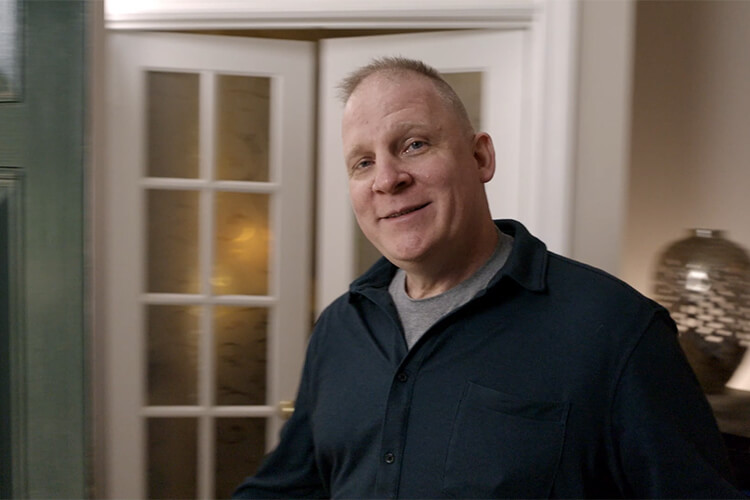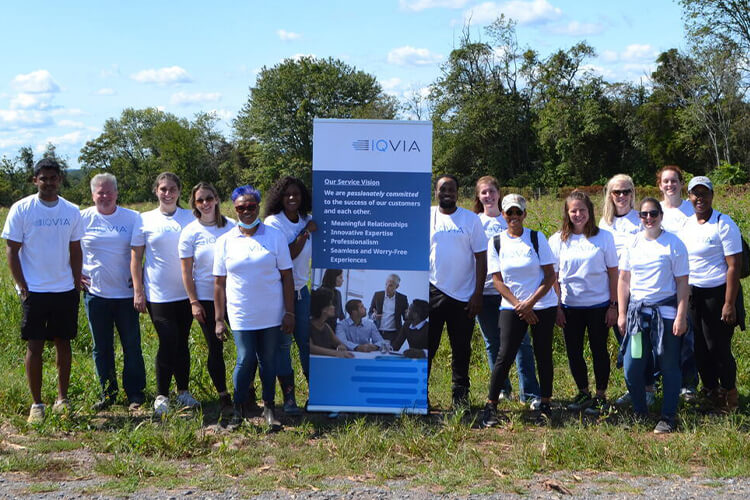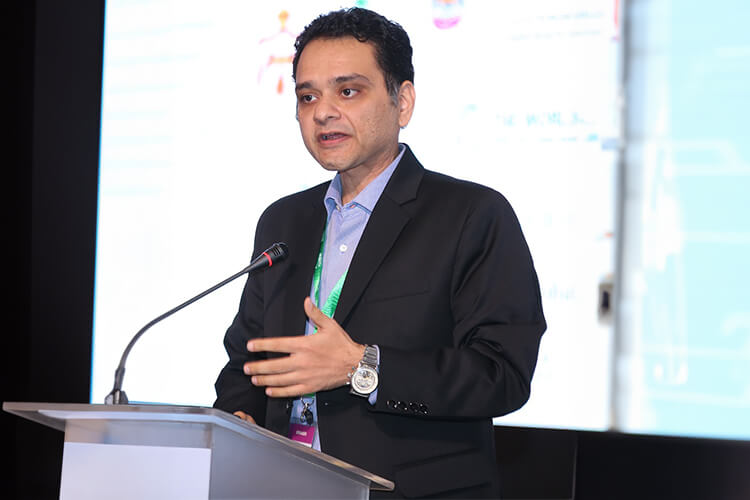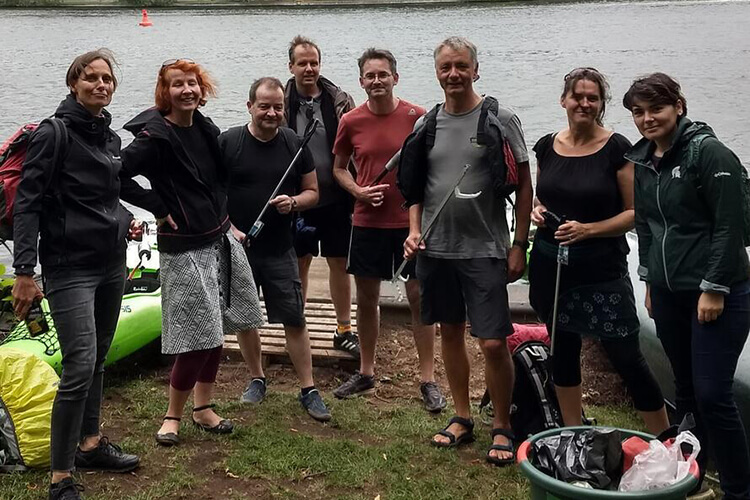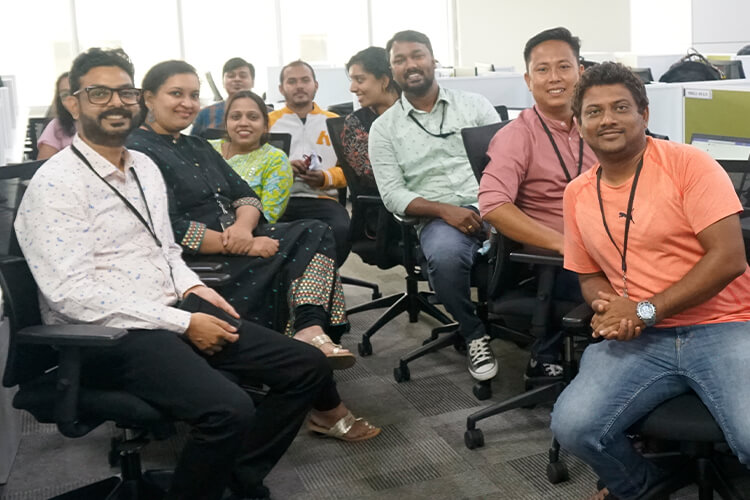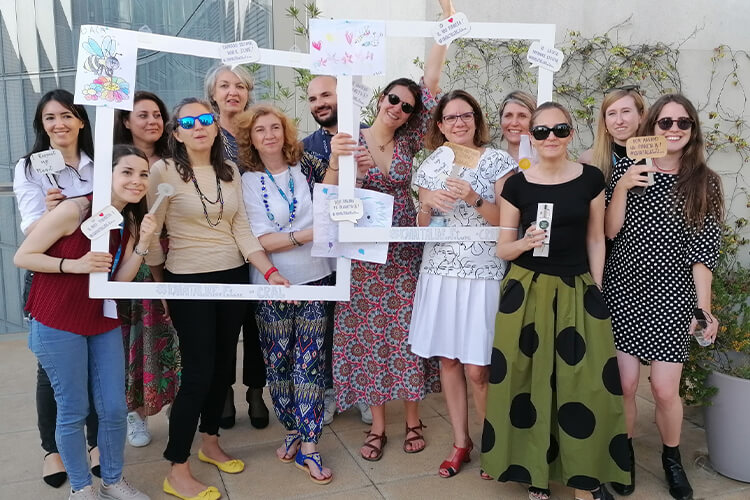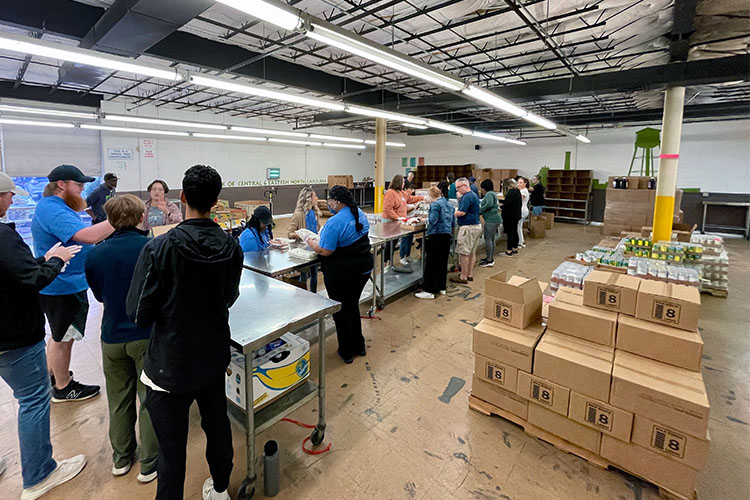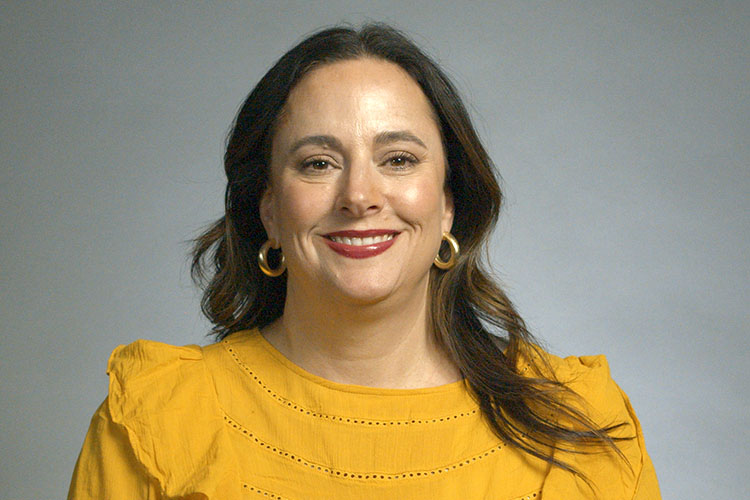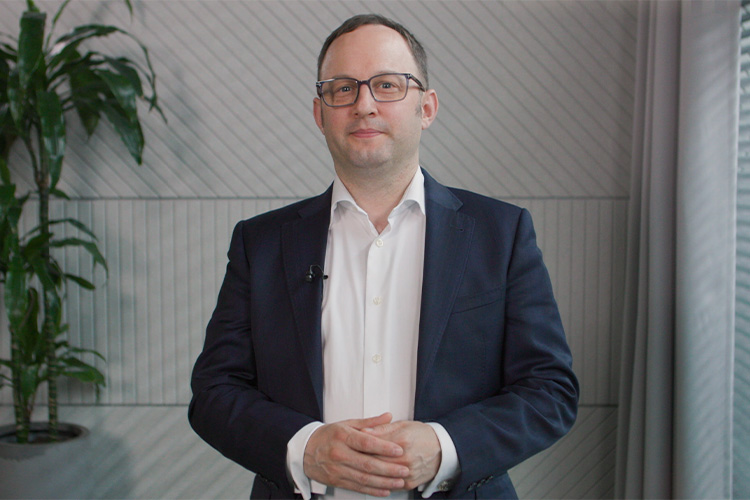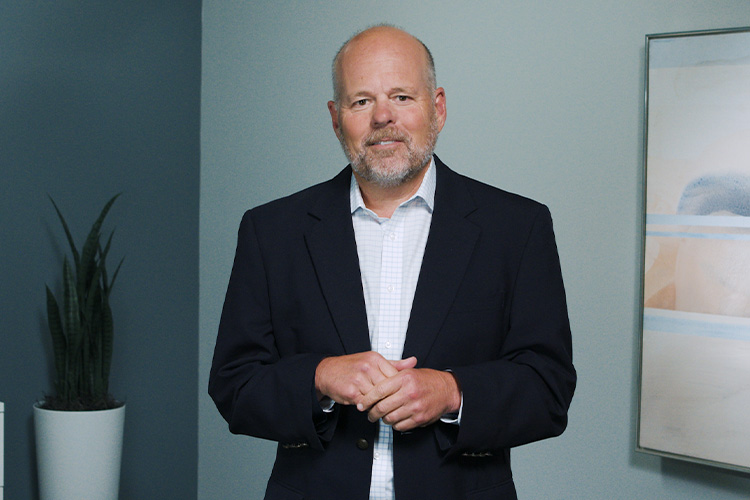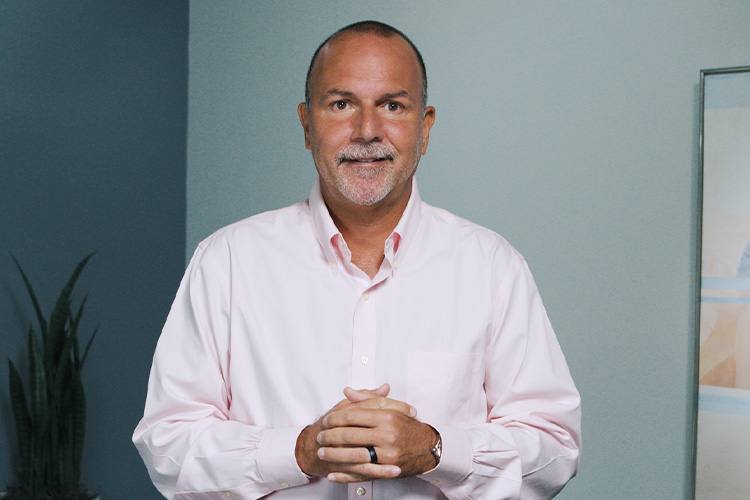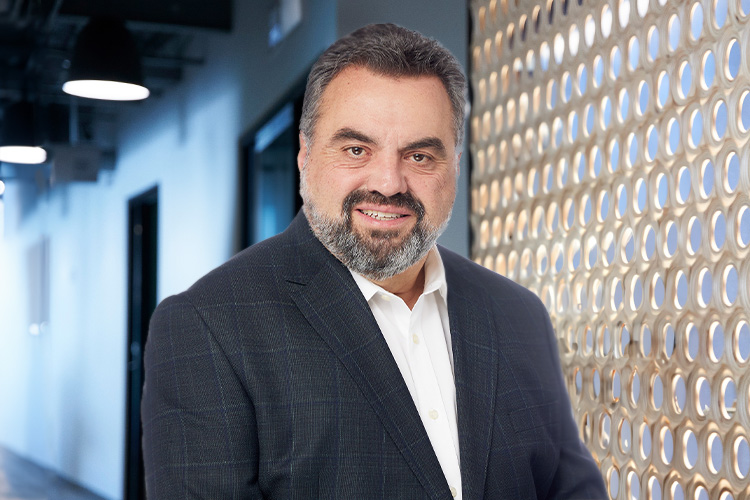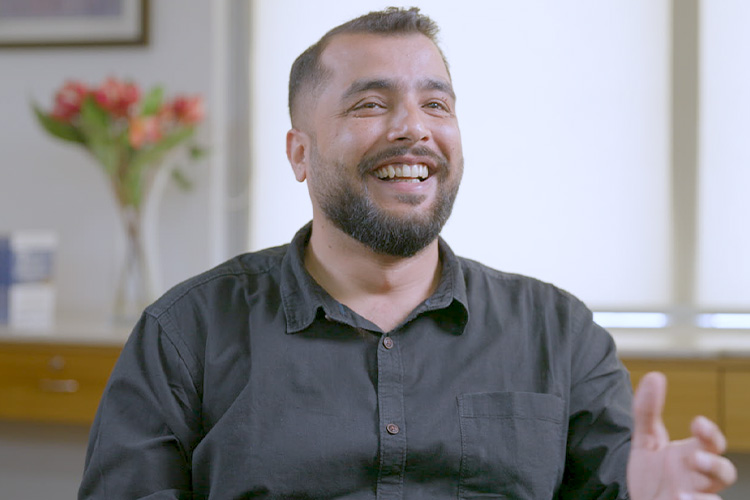
6 skills to be a successful Clinical Research Associate: #SuccessFactors
6 skills to be a successful Clinical Research Associate

![]() / Life at IQVIA — Post
/ Life at IQVIA — Post
On the hunt for a fulfilling career as a clinical research associate? Here are six essential skills to consider for a successful career path as a CRA at IQVIA.
At IQVIA, we are tackling some of the biggest challenges in healthcare in pursuit of our mission to accelerate innovation for a healthier world. Our clinical research associates (CRAs) play a vital role in that effort, serving as overseers, conductors and documenters of our clients' clinical trials.
CRAs at IQVIA are ambitious, passionate and bring a deep level of expertise to solve complex clinical issues while ensuring adherence to regulations and sponsor requirements. An IQVIA CRA’s ultimate goal is to deliver life-changing therapies as fast as possible, but without compromise.
Think this might be the career for you? Here are the top 6 factors to support a successful career as a CRA at IQVIA.
- 1. Communication
As a CRA, you are the key liaison between management, the study site, and the sponsor. With so many moving parts in clinical research, strong interpersonal skills and good command of English are important. It is also critical to have fluency in the local language of the respective country you work in. When difficult conversations come up, you’ll rely on these skills to effectively manage the situation and ask thoughtful questions.
“Effective communication as a CRA comes down to considering your audience and their unique needs,” said Clinical Functional Service Provider CRA. “As a CRA, you regularly have conversations with healthcare professionals, management and site personnel, all with varying education levels, knowledge and skillsets. It’s important to read the room, know how your audience wants to receive information and pivot based on who you’re talking to.”
2. Relationship management
A CRA builds relationships with all parties involved in the trial. Much like communication, there are nuances to these relationships. A great CRA knows when to lead versus support, can effectively manage through site-related issues and stays connected to study staff and research sites.
“Relationship management is a pivotal component of monitoring,” said Senior CRA. “Establishing trust between yourself, as the CRA, and the sponsor and site staff help create a positive work environment for all parties. These relationships are beneficial to study compliance, productivity and collaboration so we can all achieve our end goal to improve patient outcomes.”
3. Attention to detail
Keen attention to detail while executing site activities — initiation and start-up, recruitment, monitoring, site management and close-out — is critical to the quality and integrity of any study as the smallest error can lead to major consequences. As a CRA, your meticulousness in documenting how you conduct protocols, adhere to applicable regulations and capture site findings and action plans is foundational to the study’s success.
“Find a tool that works best for you… it can be anything from old fashioned pen and paper, folders, spreadsheets or digital notes…whatever you choose, just be sure to capture everything you and the site have done and still need to do,” said Janet Robinson, senior CRA 3. “We work in an environment where everything is important, and if it’s not documented, it didn’t happen. An acute eye for detail will ensure that you keep accurate and timely notes at every stage. This will help later with time management, too!”
4. Critical thinking
Rapidly changing protocols, low patient recruitment and data errors are the norm in clinical research. As a CRA, you are the decision-maker, and the site team relies on your clinical expertise when it comes to spotting and solving problems. Critical thinking is key. If you spot a site-related issue or error that could impact data or patient safety, chart a course for corrective action. Study protocols, Good Clinical Practice (GCP) documents and operating procedures are all tools to support you in mitigating risk that could jeopardize the integrity of a study or cost the sponsor time and money.
“Rather than letting adversity get you flustered, reflect on past experiences and use a ‘no time wasted’ approach to influence the outcome of a future project or milestone,” said Clinical Functional Service Provider CRA 2. “Take a step back to evaluate the situation, use your resources, training and past experiences to brainstorm potential solutions, and deliver quickly and compliantly.”
5. Time management
As a CRA, no two days are the same, and you must adapt to an ever-changing environment. A well-trained CRA must be able to effectively prioritize their time and juggle competing priorities across projects and site personnel to ensure the trial is carried out within the appropriate deadlines and within budget.
As for managing your day-to-day responsibilities, sometimes figuring out where to begin is the biggest problem. Your task list can feel overwhelming, so a simple to do list is a great way to arrange your responsibilities. Rank your tasks by priority and tackle them one by one!
6. Stress management
Being a CRA is not always glamorous. There are long days on the road, rapidly changing protocols and monitoring reports to complete across multiple study sites. Treating patients with drugs for the first time can be stressful for patients and CRAs alike.
“As a junior CRA, you have done the training, but now it’s time to pull all the pieces together, and that can be a daunting and overwhelming thought,” said Robinson. “Finding a mentor to field questions without judgement can help alleviate some of the stress. At IQVIA, we have a fantastic mentor program to help our CRAs navigate those early days and thrive through their career.”
-
Off the job, find your outlet, whether that’s mediation, exercise, reading or spending time with family and friends. IQVIA is a huge proponent of work-life balance. We know you can’t be successful at your day job if you are not taking care of your mental, physical and social health, and we are here to support you to that end.
What can you expect in return from IQVIA?
Love what you’ve read and think you’re a great fit for a CRA role? Join us! IQVIA offers a rewarding career path, compensation structure and development programs for CRAs. Our well-established training programs, access to cutting-edge technologies and the stability of a global organization enables you to have a long-lasting and fulfilling career journey as a CRA at IQVIA.
“At IQVIA, we are committed to supplying our CRAs with the right tools, training and development support to allow for success and career growth,” said Dan Mink, director, Clinical Operations. “In addition to the rewarding work, collaboration and engaged line management, there is a constant focus on development as your career growth supports also the growth of the company.”
Take the first step toward a fulfilling CRA career at IQVIA. Apply to our CRA jobs today.
Explore life at IQVIA
-
 Join IQVIA’s Global Talent Network Let’s stay connected. Join our global Talent Network to receive alerts when new opportunities become available that match your career ambitions. Learn More June 23, 2023
Join IQVIA’s Global Talent Network Let’s stay connected. Join our global Talent Network to receive alerts when new opportunities become available that match your career ambitions. Learn More June 23, 2023 -
 Innovation in everything we do We’ve deployed innovative solutions to push boundaries, make better health possible, and drive continuous improvement. Learn More July 17, 2023
Innovation in everything we do We’ve deployed innovative solutions to push boundaries, make better health possible, and drive continuous improvement. Learn More July 17, 2023 -
 We believe in giving back We support charitable organizations around the world. It’s just another way that we’re putting patients first. Learn More July 17, 2023
We believe in giving back We support charitable organizations around the world. It’s just another way that we’re putting patients first. Learn More July 17, 2023 -
 Our partners We’ve built relationships with a network of partners to help drive success in our services. Learn More July 17, 2023
Our partners We’ve built relationships with a network of partners to help drive success in our services. Learn More July 17, 2023 -
 Learn More July 19, 2023
Learn More July 19, 2023 -
 A warm welcome Gawel shares his recruitment experience and the warm welcome he received upon joining IQVIA. Learn More October 04, 2023 4 MINUTE READ Related Content Blog Blog Related Content - Culture Culture Blog
A warm welcome Gawel shares his recruitment experience and the warm welcome he received upon joining IQVIA. Learn More October 04, 2023 4 MINUTE READ Related Content Blog Blog Related Content - Culture Culture Blog -
 Learn More October 04, 2023
Learn More October 04, 2023 -
 Onboarding at IQVIA: Inspire, connect, enable Interested in joining IQVIA? Here’s what you can expect during your onboarding journey at IQVIA. Learn More October 05, 2023 5 MINUTE READ Related Content Blog Related Content - Benefits Related Content - FAQ Related Content - Saved Blog Related Content - Careers Careers Blog
Onboarding at IQVIA: Inspire, connect, enable Interested in joining IQVIA? Here’s what you can expect during your onboarding journey at IQVIA. Learn More October 05, 2023 5 MINUTE READ Related Content Blog Related Content - Benefits Related Content - FAQ Related Content - Saved Blog Related Content - Careers Careers Blog -
 Learn More October 05, 2023
Learn More October 05, 2023 -
 Advance your CRA career in Australia & New Zealand Watch these videos to learn how the CRA development program in Australia and New Zealand helped both Michelle and Barbara advance their careers. Learn More October 06, 2023 5 MINUTE READ Related Content Blog Related Content - CRA Blog Related Content - Careers Careers Video
Advance your CRA career in Australia & New Zealand Watch these videos to learn how the CRA development program in Australia and New Zealand helped both Michelle and Barbara advance their careers. Learn More October 06, 2023 5 MINUTE READ Related Content Blog Related Content - CRA Blog Related Content - Careers Careers Video -
 Mentoring students to inspire career decisions IQVIANs volunteered their time to help young students from disadvantaged backgrounds build their future and kick-start their career paths. Learn More October 06, 2023 3 MINUTE READ Related Content Blog Related Content - Culture Related Content - Diversity Blog Related Content - Belonging at IQVIA Belonging at IQVIA Article
Mentoring students to inspire career decisions IQVIANs volunteered their time to help young students from disadvantaged backgrounds build their future and kick-start their career paths. Learn More October 06, 2023 3 MINUTE READ Related Content Blog Related Content - Culture Related Content - Diversity Blog Related Content - Belonging at IQVIA Belonging at IQVIA Article -
 Learn More October 09, 2023
Learn More October 09, 2023 -
 7 skills to future-proof your career Transformations, disruptors and trends... Don’t steer away from change. Embrace it. Learn how these seven skills can help you consider whether or not you are positioned for a future-ready career. Learn More November 03, 2023 5 MINUTE READ Related Content Blog Related Content - Home Related Content - FAQ Related Content - Saved Blog Related Content - Careers Careers Article
7 skills to future-proof your career Transformations, disruptors and trends... Don’t steer away from change. Embrace it. Learn how these seven skills can help you consider whether or not you are positioned for a future-ready career. Learn More November 03, 2023 5 MINUTE READ Related Content Blog Related Content - Home Related Content - FAQ Related Content - Saved Blog Related Content - Careers Careers Article -
 From CRA to Clinical Project Management Lucia shares how she used her CRA experience to take on a new role in Clinical Project Management. Learn More October 10, 2023 5 MINUTE READ Related Content Blog Related Content - CRA Blog Related Content - Careers Related Content - Clinical Research Careers Blog
From CRA to Clinical Project Management Lucia shares how she used her CRA experience to take on a new role in Clinical Project Management. Learn More October 10, 2023 5 MINUTE READ Related Content Blog Related Content - CRA Blog Related Content - Careers Related Content - Clinical Research Careers Blog -
 A day in the life as a Senior AI Engineer Watch as Rehan Ali gives you a look into a day in his life as a Senior Artificial Intelligence Engineer at IQVIA. Learn More October 10, 2023 2 MINUTE READ Related Content Blog Related Content - Tech and Analytics Blog Related Content - Careers Careers Video
A day in the life as a Senior AI Engineer Watch as Rehan Ali gives you a look into a day in his life as a Senior Artificial Intelligence Engineer at IQVIA. Learn More October 10, 2023 2 MINUTE READ Related Content Blog Related Content - Tech and Analytics Blog Related Content - Careers Careers Video -
 ‘Most Admired’ for our passion in driving healthcare forward Executive Vice President and Chief Human Resources Officer, Trudy Stein, discusses what it means to be named to FORTUNE’s 2023 List of “World’s Most Admired Companies.” Learn More October 11, 2023 7 MINUTE READ Related Content Blog Related Content - Home Related Content - Company Related Content - Culture Related Content - CRA Related Content - Saved Blog Related Content - Culture Culture Article
‘Most Admired’ for our passion in driving healthcare forward Executive Vice President and Chief Human Resources Officer, Trudy Stein, discusses what it means to be named to FORTUNE’s 2023 List of “World’s Most Admired Companies.” Learn More October 11, 2023 7 MINUTE READ Related Content Blog Related Content - Home Related Content - Company Related Content - Culture Related Content - CRA Related Content - Saved Blog Related Content - Culture Culture Article -
 Learn More October 11, 2023
Learn More October 11, 2023 -
 Bulgarian team helps keep park litter-free With a passion for nature, one IQVIA team volunteered to help keep a national park litter-free. Learn More October 12, 2023 2 MINUTE READ Related Content Blog Related Content - Culture Related Content - Benefits Blog Related Content - Community Community Blog
Bulgarian team helps keep park litter-free With a passion for nature, one IQVIA team volunteered to help keep a national park litter-free. Learn More October 12, 2023 2 MINUTE READ Related Content Blog Related Content - Culture Related Content - Benefits Blog Related Content - Community Community Blog -
 Tips to maintain a healthy work experience With back-to-back meetings, a lengthy task list or being stuck behind a desk, it can be challenging to maintain a healthy work experience. Here are nine valuable tips for you to try while on the job. Learn More October 12, 2023 3 MINUTE READ Related Content Blog Related Content - Culture Related Content - Benefits Related Content - FAQ Related Content - Saved Blog Related Content - Culture Culture Article
Tips to maintain a healthy work experience With back-to-back meetings, a lengthy task list or being stuck behind a desk, it can be challenging to maintain a healthy work experience. Here are nine valuable tips for you to try while on the job. Learn More October 12, 2023 3 MINUTE READ Related Content Blog Related Content - Culture Related Content - Benefits Related Content - FAQ Related Content - Saved Blog Related Content - Culture Culture Article -
 A triathlete’s take on IQVIA work-life balance Talent acquisition lead, Luke Davison, describes how IQVIA provides him with the work-life balance he needs to make time for his passion for swimming, cycling and running. Learn More October 12, 2023 4 MINUTE READ Related Content Blog Related Content - Culture Related Content - Benefits Blog Related Content - Culture Culture Blog
A triathlete’s take on IQVIA work-life balance Talent acquisition lead, Luke Davison, describes how IQVIA provides him with the work-life balance he needs to make time for his passion for swimming, cycling and running. Learn More October 12, 2023 4 MINUTE READ Related Content Blog Related Content - Culture Related Content - Benefits Blog Related Content - Culture Culture Blog -
 Career growth as a CRA Discover ways to grow and stretch into any of our clinical career opportunities when you join as a CRA. Learn More October 12, 2023 6 MINUTE READ Related Content Blog Related Content - CRA Blog Related Content - Careers Related Content - Clinical Research Careers Infographic
Career growth as a CRA Discover ways to grow and stretch into any of our clinical career opportunities when you join as a CRA. Learn More October 12, 2023 6 MINUTE READ Related Content Blog Related Content - CRA Blog Related Content - Careers Related Content - Clinical Research Careers Infographic -
 No stone left unturned: A glimpse at Wendy’s career journey President of Clinical Operations, R&DS, shares pivotal career moments and transformative experiences as well as how the power of career exploration has shaped her into the leader she is today. Learn More November 06, 2023 6 MINUTE READ Related Content Blog Related Content - CRA Blog Related Content - Careers Related Content - Clinical Research Careers Blog
No stone left unturned: A glimpse at Wendy’s career journey President of Clinical Operations, R&DS, shares pivotal career moments and transformative experiences as well as how the power of career exploration has shaped her into the leader she is today. Learn More November 06, 2023 6 MINUTE READ Related Content Blog Related Content - CRA Blog Related Content - Careers Related Content - Clinical Research Careers Blog -
 What is an Employee Resource Group? IQVIA’s Employee Resource Groups provide colleagues with unique spaces to expand their community experience, collaborate in new ways and create avenues for personal development. Learn More October 12, 2023 2 MINUTE READ Blog Belonging at IQVIA Blog
What is an Employee Resource Group? IQVIA’s Employee Resource Groups provide colleagues with unique spaces to expand their community experience, collaborate in new ways and create avenues for personal development. Learn More October 12, 2023 2 MINUTE READ Blog Belonging at IQVIA Blog -
 How we work We understand life’s complexities so no matter the role, we strive to find the balance of work flexibility so you can succeed both professionally and personally. Learn More November 07, 2023 4 MINUTE READ Related Content Blog Related Content - Home Related Content - Company Related Content - Culture Related Content - Benefits Related Content - FAQ Related Content - Saved Blog Related Content - Culture Related Content - Consulting Culture Article
How we work We understand life’s complexities so no matter the role, we strive to find the balance of work flexibility so you can succeed both professionally and personally. Learn More November 07, 2023 4 MINUTE READ Related Content Blog Related Content - Home Related Content - Company Related Content - Culture Related Content - Benefits Related Content - FAQ Related Content - Saved Blog Related Content - Culture Related Content - Consulting Culture Article -
 The internship experience Three former interns give a peek into their experience during IQVIA's 10-week internship program. Learn More October 12, 2023 2 MINUTE READ Related Content Blog Blog Related Content - Interns Interns Video
The internship experience Three former interns give a peek into their experience during IQVIA's 10-week internship program. Learn More October 12, 2023 2 MINUTE READ Related Content Blog Blog Related Content - Interns Interns Video -
 Your guide to IQVIA internships Get answers to some of the most commonly asked internship questions. Learn More November 05, 2023 7 MINUTE READ Related Content Blog Blog Related Content - Interns Interns Article
Your guide to IQVIA internships Get answers to some of the most commonly asked internship questions. Learn More November 05, 2023 7 MINUTE READ Related Content Blog Blog Related Content - Interns Interns Article -
 Disabilities and Carers Network Employee Resource Group at IQVIA Disabilities and Carers Network Employee Resource Group at IQVIA Learn More October 13, 2023
Disabilities and Carers Network Employee Resource Group at IQVIA Disabilities and Carers Network Employee Resource Group at IQVIA Learn More October 13, 2023 -
 Disclaimer Disclaimer Learn More October 13, 2023
Disclaimer Disclaimer Learn More October 13, 2023 -
 Emerging Professionals Network Employee Resource Group at IQVIA Emerging Professionals Network Employee Resource Group at IQVIA Learn More October 13, 2023
Emerging Professionals Network Employee Resource Group at IQVIA Emerging Professionals Network Employee Resource Group at IQVIA Learn More October 13, 2023 -
 Equal Opportunity Employment at IQVIA At IQVIA, all qualified applicants will receive consideration for employment without regard to race, color, religion, sex, sexual orientation, gender identity, national origin, disability, status as a protected veteran, or any other status protected by applicable law. Learn More October 13, 2023
Equal Opportunity Employment at IQVIA At IQVIA, all qualified applicants will receive consideration for employment without regard to race, color, religion, sex, sexual orientation, gender identity, national origin, disability, status as a protected veteran, or any other status protected by applicable law. Learn More October 13, 2023 -
 IQVIANs awarded 2022 HBA Luminary and Rising Star Susan Lipsitz has been named IQVIA’s Healthcare Businesswomen’s Association 2022 Luminary, and Sue Bailey as IQVIA’s HBA 2022 Rising Star. Learn More December 30, 2022 3 MINUTE READ Related Content Blog Related Content - Diversity Blog Related Content - Culture Culture Article
IQVIANs awarded 2022 HBA Luminary and Rising Star Susan Lipsitz has been named IQVIA’s Healthcare Businesswomen’s Association 2022 Luminary, and Sue Bailey as IQVIA’s HBA 2022 Rising Star. Learn More December 30, 2022 3 MINUTE READ Related Content Blog Related Content - Diversity Blog Related Content - Culture Culture Article -
 IQVIA’s 2021 HBA Award Recipients IQVIANs recognized as 2021 Luminary and Rising Star by the Healthcare Businesswomen’s Association. Learn More December 30, 2021 4 MINUTE READ Related Content Blog Blog Related Content - Belonging at IQVIA Belonging at IQVIA Article
IQVIA’s 2021 HBA Award Recipients IQVIANs recognized as 2021 Luminary and Rising Star by the Healthcare Businesswomen’s Association. Learn More December 30, 2021 4 MINUTE READ Related Content Blog Blog Related Content - Belonging at IQVIA Belonging at IQVIA Article -
 IQVIA’s nurses are frontline heroes A team of Nurse Advisors in the U.K. gave more than 20,000 infusions and injections to patients at the height of the pandemic. Learn More October 16, 2023 3 MINUTE READ Related Content Blog Blog Related Content - Careers Careers Article
IQVIA’s nurses are frontline heroes A team of Nurse Advisors in the U.K. gave more than 20,000 infusions and injections to patients at the height of the pandemic. Learn More October 16, 2023 3 MINUTE READ Related Content Blog Blog Related Content - Careers Careers Article -
 IT by day. Artist by night. Meet Paulo. While his days are spent supporting IQVIA with data, software and equipment requests, his passion for drawing comes out at night. Learn More October 16, 2023 1 MINUTE READ Related Content Blog Related Content - Tech and Analytics Blog Related Content - Culture Culture Article
IT by day. Artist by night. Meet Paulo. While his days are spent supporting IQVIA with data, software and equipment requests, his passion for drawing comes out at night. Learn More October 16, 2023 1 MINUTE READ Related Content Blog Related Content - Tech and Analytics Blog Related Content - Culture Culture Article -
 Life-changing medication reminds mother of IQVIA’s purpose Celina Buelga is intimately familiar with the impact of IQVIA’s work and the power clinical research has on patient lives. Learn More October 16, 2023 6 MINUTE READ Related Content Blog Related Content - Company Blog Related Content - Culture Culture Blog
Life-changing medication reminds mother of IQVIA’s purpose Celina Buelga is intimately familiar with the impact of IQVIA’s work and the power clinical research has on patient lives. Learn More October 16, 2023 6 MINUTE READ Related Content Blog Related Content - Company Blog Related Content - Culture Culture Blog -
 From CRA to Clinical Operations Lead Santa highlights the limitless clinical career opportunities and benefits of working at a growing, global organization. Learn More October 16, 2023 5 MINUTE READ Related Content Blog Related Content - CRA Blog Related Content - Careers Related Content - Clinical Research Careers Blog
From CRA to Clinical Operations Lead Santa highlights the limitless clinical career opportunities and benefits of working at a growing, global organization. Learn More October 16, 2023 5 MINUTE READ Related Content Blog Related Content - CRA Blog Related Content - Careers Related Content - Clinical Research Careers Blog -
 Make an impact during your video interview The key to making an impact during your next video interview is preparation. Check out these tips to master the art of the virtual interview. Learn More October 16, 2023 3 MINUTE READ Related Content Blog Related Content - FAQ Related Content - Saved Blog Related Content - Careers Careers Article
Make an impact during your video interview The key to making an impact during your next video interview is preparation. Check out these tips to master the art of the virtual interview. Learn More October 16, 2023 3 MINUTE READ Related Content Blog Related Content - FAQ Related Content - Saved Blog Related Content - Careers Careers Article -
 Alumni Spotlight: Doing the math and making it count Alumna, Karrie Liu, a mathematics guru, turned her passion for numbers into a career in real world healthcare data and analytics. Learn More October 17, 2023 4 MINUTE READ Related Content Blog Related Content - Alumni Blog Related Content - Community Community Blog
Alumni Spotlight: Doing the math and making it count Alumna, Karrie Liu, a mathematics guru, turned her passion for numbers into a career in real world healthcare data and analytics. Learn More October 17, 2023 4 MINUTE READ Related Content Blog Related Content - Alumni Blog Related Content - Community Community Blog -
 Alumni Spotlight: IQVIA career leads to non-profit IQVIA Alumni Network member, Shekar Hariharan, shares how his experience at IQVIA positioned him to follow his passion for philanthropy and start a non-profit. Learn More October 17, 2023 3 MINUTE READ Related Content Blog Related Content - Alumni Blog Related Content - Community Community Blog
Alumni Spotlight: IQVIA career leads to non-profit IQVIA Alumni Network member, Shekar Hariharan, shares how his experience at IQVIA positioned him to follow his passion for philanthropy and start a non-profit. Learn More October 17, 2023 3 MINUTE READ Related Content Blog Related Content - Alumni Blog Related Content - Community Community Blog -
 Behind the desk of an AI Engineer Deepak shares what it's like to work in AI at IQVIA, including his career journey, passion for his work and key skills for success. Learn More November 04, 2023 4 MINUTE READ Related Content Blog Related Content - Tech and Analytics Blog Related Content - Careers Careers Blog
Behind the desk of an AI Engineer Deepak shares what it's like to work in AI at IQVIA, including his career journey, passion for his work and key skills for success. Learn More November 04, 2023 4 MINUTE READ Related Content Blog Related Content - Tech and Analytics Blog Related Content - Careers Careers Blog -
 The 3 best things about IQVIA Watch to find out what our leaders are saying about our people, the breadth and depth of our capabilities, and IQVIA’s commitment to a growth mindset. Learn More October 17, 2023 5 MINUTE READ Related Content Blog Related Content - Home Related Content - Company Related Content - Culture Related Content - Saved Blog Related Content - Careers Culture Video
The 3 best things about IQVIA Watch to find out what our leaders are saying about our people, the breadth and depth of our capabilities, and IQVIA’s commitment to a growth mindset. Learn More October 17, 2023 5 MINUTE READ Related Content Blog Related Content - Home Related Content - Company Related Content - Culture Related Content - Saved Blog Related Content - Careers Culture Video -
 Build a career in talent acquisition In this video, Senior Vice President, Tim Wesson, talks about Global Talent Acquisition at IQVIA, covering everything from resources to benefits to career growth. Learn More October 17, 2023 4 MINUTE READ Related Content Blog Blog Related Content - Careers Careers Video
Build a career in talent acquisition In this video, Senior Vice President, Tim Wesson, talks about Global Talent Acquisition at IQVIA, covering everything from resources to benefits to career growth. Learn More October 17, 2023 4 MINUTE READ Related Content Blog Blog Related Content - Careers Careers Video -
 Impressum Impressum (German) Learn More October 17, 2023
Impressum Impressum (German) Learn More October 17, 2023 -
 Quick Questions with a Software Engineer Go fly fishing with Michael Amato to get the inside scoop on life as a Software Engineer at IQVIA. Learn More October 17, 2023 3 MINUTE READ Related Content Blog Related Content - Tech and Analytics Blog Related Content - Careers Careers Video
Quick Questions with a Software Engineer Go fly fishing with Michael Amato to get the inside scoop on life as a Software Engineer at IQVIA. Learn More October 17, 2023 3 MINUTE READ Related Content Blog Related Content - Tech and Analytics Blog Related Content - Careers Careers Video -
 Quick Questions with a Technical Consultant Interested in building a career in life sciences consulting? In this video, Andrew talks about available roles and shares some tips for success. Learn More October 17, 2023 3 MINUTE READ Related Content Blog Blog Related Content - Careers Careers Video
Quick Questions with a Technical Consultant Interested in building a career in life sciences consulting? In this video, Andrew talks about available roles and shares some tips for success. Learn More October 17, 2023 3 MINUTE READ Related Content Blog Blog Related Content - Careers Careers Video -
 One IQVIA, Multiple Careers Take your career to the next level by unlocking access to our internal AI-powered talent marketplace platform – where you can expand your skills and achieve career aspirations at IQVIA. Learn More October 17, 2023 3 MINUTE READ Related Content Blog Related Content - Company Related Content - Culture Related Content - Benefits Related Content - FAQ Related Content - Saved Blog Related Content - Careers Careers Blog
One IQVIA, Multiple Careers Take your career to the next level by unlocking access to our internal AI-powered talent marketplace platform – where you can expand your skills and achieve career aspirations at IQVIA. Learn More October 17, 2023 3 MINUTE READ Related Content Blog Related Content - Company Related Content - Culture Related Content - Benefits Related Content - FAQ Related Content - Saved Blog Related Content - Careers Careers Blog -
 REACH volunteers at America's Grow-a-Row IQVIA’s Race, Ethnicity, and Cultural Heritage Employee Resource Group supports their community and highlights health inequalities, partnering with America’s Grow-a-Row. Learn More October 09, 2023 1 MINUTE READ Blog Related Content - Culture Related Content - Benefits Related Content - Diversity Blog Related Content - Belonging at IQVIA Belonging at IQVIA Article
REACH volunteers at America's Grow-a-Row IQVIA’s Race, Ethnicity, and Cultural Heritage Employee Resource Group supports their community and highlights health inequalities, partnering with America’s Grow-a-Row. Learn More October 09, 2023 1 MINUTE READ Blog Related Content - Culture Related Content - Benefits Related Content - Diversity Blog Related Content - Belonging at IQVIA Belonging at IQVIA Article -
 Olivia Bicknell’s #BraveReturn to IQVIA Olivia Bicknell’s #BraveReturn to IQVIA Learn More October 18, 2023 6 MINUTE READ Related Content Blog Related Content - Alumni Careers Article
Olivia Bicknell’s #BraveReturn to IQVIA Olivia Bicknell’s #BraveReturn to IQVIA Learn More October 18, 2023 6 MINUTE READ Related Content Blog Related Content - Alumni Careers Article -
 Tech Careers in the Middle East Our tech colleagues are developing cutting edge digital tools and applications to help hospitals, pharma companies and governments save lives and improve patient outcomes. Learn More October 18, 2023 6 MINUTE READ Related Content Blog Related Content - Tech and Analytics Careers Video
Tech Careers in the Middle East Our tech colleagues are developing cutting edge digital tools and applications to help hospitals, pharma companies and governments save lives and improve patient outcomes. Learn More October 18, 2023 6 MINUTE READ Related Content Blog Related Content - Tech and Analytics Careers Video -
 The best things about IQVIA Global Trials Manager, Ola Balacka, is letting you in on a secret: the top three things she likes best about working at IQVIA. Learn More October 18, 2023 5 MINUTE READ Blog Culture Blog
The best things about IQVIA Global Trials Manager, Ola Balacka, is letting you in on a secret: the top three things she likes best about working at IQVIA. Learn More October 18, 2023 5 MINUTE READ Blog Culture Blog -
 How to ace an interview at IQVIA We want your true potential to shine throughout the interview process so we’re sharing advice to prepare you for your upcoming interview. Learn More November 02, 2023 4 MINUTE READ Related Content Blog Related Content - FAQ Related Content - Saved Blog Related Content - Careers Careers Article
How to ace an interview at IQVIA We want your true potential to shine throughout the interview process so we’re sharing advice to prepare you for your upcoming interview. Learn More November 02, 2023 4 MINUTE READ Related Content Blog Related Content - FAQ Related Content - Saved Blog Related Content - Careers Careers Article -
 Our North America intern program What does an intern at IQVIA do? Hear from our Summer 2021 interns in North America to get an inside look. Learn More October 18, 2023 3 MINUTE READ Blog Interns Video
Our North America intern program What does an intern at IQVIA do? Hear from our Summer 2021 interns in North America to get an inside look. Learn More October 18, 2023 3 MINUTE READ Blog Interns Video -
 Passion for Public Health When asked about his work at IQVIA, Deepak Batra was quick to share his passion for improving patient health and the positive impact he makes every day as a Senior Principal of Global Public Health. Learn More October 18, 2023 4 MINUTE READ Related Content Blog Related Content - Home Related Content - Company Related Content - Culture Blog Related Content - Culture Culture Blog
Passion for Public Health When asked about his work at IQVIA, Deepak Batra was quick to share his passion for improving patient health and the positive impact he makes every day as a Senior Principal of Global Public Health. Learn More October 18, 2023 4 MINUTE READ Related Content Blog Related Content - Home Related Content - Company Related Content - Culture Blog Related Content - Culture Culture Blog -
 How embracing collaboration supported Bhavani’s career journey Bhavani Sivalingam, SVP of Research and Development Solutions, JAPAC, attributes some of her proudest career moments and lessons learned to the power of teamwork and leaning into your network. Learn More October 18, 2023 6 MINUTE READ Related Content Blog Related Content - CRA Blog Related Content - Careers Related Content - Clinical Research Careers Blog
How embracing collaboration supported Bhavani’s career journey Bhavani Sivalingam, SVP of Research and Development Solutions, JAPAC, attributes some of her proudest career moments and lessons learned to the power of teamwork and leaning into your network. Learn More October 18, 2023 6 MINUTE READ Related Content Blog Related Content - CRA Blog Related Content - Careers Related Content - Clinical Research Careers Blog -
 Always growing: Journey from Intern to Statistical Programming Manager Brought to IQVIA through a week-long work experience program, this Statistical Programmer's career journey exemplifies IQVIA's commitment to continuous growth. Learn More October 18, 2023 6 MINUTE READ Related Content Blog Blog Related Content - Careers Blog Related Content - Interns Related Content - Clinical Research Careers Blog
Always growing: Journey from Intern to Statistical Programming Manager Brought to IQVIA through a week-long work experience program, this Statistical Programmer's career journey exemplifies IQVIA's commitment to continuous growth. Learn More October 18, 2023 6 MINUTE READ Related Content Blog Blog Related Content - Careers Blog Related Content - Interns Related Content - Clinical Research Careers Blog -
 Multi-Faith Network Employee Resource Group at IQVIA Multi-Faith Network Employee Resource Group at IQVIA Learn More October 17, 2023
Multi-Faith Network Employee Resource Group at IQVIA Multi-Faith Network Employee Resource Group at IQVIA Learn More October 17, 2023 -
 5 skills to be a successful consultant: #SuccessFactors Want to accelerate your growth while working on impactful global projects in the life sciences sector? Then a consultant role at IQVIA could be the right fit for you. Here are five key traits you will need to bring to the table. Learn More October 19, 2023 6 MINUTE READ Blog Careers Article
5 skills to be a successful consultant: #SuccessFactors Want to accelerate your growth while working on impactful global projects in the life sciences sector? Then a consultant role at IQVIA could be the right fit for you. Here are five key traits you will need to bring to the table. Learn More October 19, 2023 6 MINUTE READ Blog Careers Article -
 PRIDE Employee Resource Group at IQVIA PRIDE Employee Resource Group at IQVIA Learn More October 19, 2023
PRIDE Employee Resource Group at IQVIA PRIDE Employee Resource Group at IQVIA Learn More October 19, 2023 -
 Q2 Solutions COVID-19 Vaccine Status The health and safety of our employees, customers, patients with whom we interact, and communities are essential to our commitment to helping our customers improve healthcare worldwide. Learn More October 19, 2023
Q2 Solutions COVID-19 Vaccine Status The health and safety of our employees, customers, patients with whom we interact, and communities are essential to our commitment to helping our customers improve healthcare worldwide. Learn More October 19, 2023 -
 5 ways to grow your career Fulfill your career aspirations at IQVIA by unlocking access to these five development resources. Learn More October 19, 2023 4 MINUTE READ Related Content Blog Related Content - Home Related Content - Company Related Content - Culture Related Content - Benefits Related Content - FAQ Related Content - Saved Blog Related Content - Careers Careers Article
5 ways to grow your career Fulfill your career aspirations at IQVIA by unlocking access to these five development resources. Learn More October 19, 2023 4 MINUTE READ Related Content Blog Related Content - Home Related Content - Company Related Content - Culture Related Content - Benefits Related Content - FAQ Related Content - Saved Blog Related Content - Careers Careers Article -
 Germany employees kayak to fight environmental pollution IQVIANs use their IQVIA Day to paddle across Berlin to fish plastic and other garbage from the waters. Learn More October 19, 2023 1 MINUTE READ Related Content Blog Related Content - Culture Related Content - Benefits Blog Related Content - Community Community Article
Germany employees kayak to fight environmental pollution IQVIANs use their IQVIA Day to paddle across Berlin to fish plastic and other garbage from the waters. Learn More October 19, 2023 1 MINUTE READ Related Content Blog Related Content - Culture Related Content - Benefits Blog Related Content - Community Community Article -
 Inaugural Project Leadership internship program Project Management Analysts share personal insights about the value of their IQVIA internships. Learn More October 20, 2023 5 MINUTE READ Related Content Blog Blog Related Content - Interns Interns Blog
Inaugural Project Leadership internship program Project Management Analysts share personal insights about the value of their IQVIA internships. Learn More October 20, 2023 5 MINUTE READ Related Content Blog Blog Related Content - Interns Interns Blog -
 An internship at IQVIA India Discover a career with greater purpose as an intern at IQVIA India. Here, you’ll gain on-the-job experience, partner with industry experts, and be empowered to learn and grow with us. Learn More October 20, 2023 3 MINUTE READ Related Content Blog Blog Related Content - Interns Interns Blog
An internship at IQVIA India Discover a career with greater purpose as an intern at IQVIA India. Here, you’ll gain on-the-job experience, partner with industry experts, and be empowered to learn and grow with us. Learn More October 20, 2023 3 MINUTE READ Related Content Blog Blog Related Content - Interns Interns Blog -
 Celebrating our people: India Appreciation Week To recognize the more than 20,000 employees based in India, the local team held their first India Appreciation Week. Learn More October 20, 2023 6 MINUTE READ Related Content Blog Blog Related Content - Community Community Blog
Celebrating our people: India Appreciation Week To recognize the more than 20,000 employees based in India, the local team held their first India Appreciation Week. Learn More October 20, 2023 6 MINUTE READ Related Content Blog Blog Related Content - Community Community Blog -
 IQVIA Italia hosts ‘We (will) Walk (you)’ challenge IQVIANs in Italy help create sustainable behaviors by competing in a walking challenge, with steps exceeding the Earth’s circumference. Learn More October 20, 2023 2 MINUTE READ Related Content Blog Related Content - Culture Related Content - Benefits Blog Related Content - Community Community Blog
IQVIA Italia hosts ‘We (will) Walk (you)’ challenge IQVIANs in Italy help create sustainable behaviors by competing in a walking challenge, with steps exceeding the Earth’s circumference. Learn More October 20, 2023 2 MINUTE READ Related Content Blog Related Content - Culture Related Content - Benefits Blog Related Content - Community Community Blog -
 IQVIAN ranks second place in World Transplant Games 5K LaTonya Jones shares how her work at IQVIA and personal transplant journey inspired her recent accomplishment at the World Transplant Games 5K. Learn More October 20, 2023 3 MINUTE READ Related Content Blog Blog Related Content - Community Community Blog
IQVIAN ranks second place in World Transplant Games 5K LaTonya Jones shares how her work at IQVIA and personal transplant journey inspired her recent accomplishment at the World Transplant Games 5K. Learn More October 20, 2023 3 MINUTE READ Related Content Blog Blog Related Content - Community Community Blog -
 IQVIA wins four learning excellence awards 2022 Brandon Hall Human Capital Management Excellence Awards recognize IQVIA in multiple categories. Learn More October 20, 2023 4 MINUTE READ Related Content Blog Blog Related Content - Culture Culture Blog
IQVIA wins four learning excellence awards 2022 Brandon Hall Human Capital Management Excellence Awards recognize IQVIA in multiple categories. Learn More October 20, 2023 4 MINUTE READ Related Content Blog Blog Related Content - Culture Culture Blog -
 Equal Opportunity Employment at Q2 Solutions Q2 Solutions is committed to providing equal employment opportunities for all, including veterans and candidates with disabilities. Learn More October 24, 2023
Equal Opportunity Employment at Q2 Solutions Q2 Solutions is committed to providing equal employment opportunities for all, including veterans and candidates with disabilities. Learn More October 24, 2023 -
 Equal Opportunity Employment at Clintec Clintec is committed to providing equal employment opportunities for all, including veterans and candidates with disabilities. Learn More October 24, 2023
Equal Opportunity Employment at Clintec Clintec is committed to providing equal employment opportunities for all, including veterans and candidates with disabilities. Learn More October 24, 2023 -
 Clintec COVID-19 Vaccine Status The health and safety of our employees, customers, patients with whom we interact, and communities are essential to our commitment to helping our customers improve healthcare worldwide. Learn More October 24, 2023
Clintec COVID-19 Vaccine Status The health and safety of our employees, customers, patients with whom we interact, and communities are essential to our commitment to helping our customers improve healthcare worldwide. Learn More October 24, 2023 -
 Clintec COVID-19 Vaccine Status The health and safety of our employees, customers, patients with whom we interact, and communities are essential to our commitment to helping our customers improve healthcare worldwide. Learn More October 24, 2023
Clintec COVID-19 Vaccine Status The health and safety of our employees, customers, patients with whom we interact, and communities are essential to our commitment to helping our customers improve healthcare worldwide. Learn More October 24, 2023 -
 European Thought Leadership internship program European Thought Leadership interns, Riming and Bayley, reflect on their time at IQVIA, sharing their first impressions and most memorable moments. Learn More October 24, 2023 5 MINUTE READ Related Content Blog Blog Related Content - Interns Interns Interview
European Thought Leadership internship program European Thought Leadership interns, Riming and Bayley, reflect on their time at IQVIA, sharing their first impressions and most memorable moments. Learn More October 24, 2023 5 MINUTE READ Related Content Blog Blog Related Content - Interns Interns Interview -
 Black Leadership Network Employee Resource Group at IQVIA Black Leadership Network Employee Resource Group at IQVIA Learn More October 24, 2023
Black Leadership Network Employee Resource Group at IQVIA Black Leadership Network Employee Resource Group at IQVIA Learn More October 24, 2023 -
 RRace, Ethnicity And Cultural Heritage Employee Resource Group at IQVIA Race, Ethnicity And Cultural Heritage Employee Resource Group at IQVIA Learn More October 25, 2023
RRace, Ethnicity And Cultural Heritage Employee Resource Group at IQVIA Race, Ethnicity And Cultural Heritage Employee Resource Group at IQVIA Learn More October 25, 2023 -
 Technology and Analytics Careers with IQVIA India Technology and Analytics Careers with IQVIA India Learn More October 25, 2023
Technology and Analytics Careers with IQVIA India Technology and Analytics Careers with IQVIA India Learn More October 25, 2023 -
 Veterans Employee Resource Group at IQVIA Veterans Employee Resource Group at IQVIA Learn More October 25, 2023
Veterans Employee Resource Group at IQVIA Veterans Employee Resource Group at IQVIA Learn More October 25, 2023 -
 Women Inspired Network Employee Resource Group at IQVIA Women Inspired Network Employee Resource Group at IQVIA Learn More October 24, 2023
Women Inspired Network Employee Resource Group at IQVIA Women Inspired Network Employee Resource Group at IQVIA Learn More October 24, 2023 -
 Detra makes her #ReturnToIQVIA Clinical Project Manager, Detra Mason, shares what she’s always valued about working at IQVIA and the positive experiences that encouraged her #ReturnToIQVIA Learn More October 17, 2023 4 MINUTE READ Blog Careers Article
Detra makes her #ReturnToIQVIA Clinical Project Manager, Detra Mason, shares what she’s always valued about working at IQVIA and the positive experiences that encouraged her #ReturnToIQVIA Learn More October 17, 2023 4 MINUTE READ Blog Careers Article -
 5 skills for IT Design & Development Learn what five skills drive the success of our technology experts. Learn More October 17, 2023 6 MINUTE READ Related Content Blog Related Content - Tech and Analytics Blog Related Content - Careers Careers Article
5 skills for IT Design & Development Learn what five skills drive the success of our technology experts. Learn More October 17, 2023 6 MINUTE READ Related Content Blog Related Content - Tech and Analytics Blog Related Content - Careers Careers Article -
 Achieving work-life balance at IQVIA Find out what employees are saying about achieving work-life balance at IQVIA and having time for activities outside of work. Learn More October 06, 2023 4 MINUTE READ Related Content Blog Related Content - Home Related Content - Culture Related Content - Benefits Related Content - Saved Blog Related Content - Culture Culture Blog
Achieving work-life balance at IQVIA Find out what employees are saying about achieving work-life balance at IQVIA and having time for activities outside of work. Learn More October 06, 2023 4 MINUTE READ Related Content Blog Related Content - Home Related Content - Culture Related Content - Benefits Related Content - Saved Blog Related Content - Culture Culture Blog -
 Learn More October 04, 2023
Learn More October 04, 2023 -
 A day in the life as a Clinical Operations Manager Join Candice Bond as she takes you through a day in her life as a Clinical Operations Manager at IQVIA. Learn More January 23, 2024 2 Minute Read Related Content Blog Blog Related Content - Careers Related Content - Clinical Research Careers Video
A day in the life as a Clinical Operations Manager Join Candice Bond as she takes you through a day in her life as a Clinical Operations Manager at IQVIA. Learn More January 23, 2024 2 Minute Read Related Content Blog Blog Related Content - Careers Related Content - Clinical Research Careers Video -
 Quick Questions with a Clinical Research Associate Play a game of pickleball with Nisha Shah to get a glimpse into work and life as a CRA at IQVIA. Learn More January 30, 2024 3 minute read Related Content Blog Related Content - CRA Blog Related Content - Careers Related Content - Clinical Research Careers Blog
Quick Questions with a Clinical Research Associate Play a game of pickleball with Nisha Shah to get a glimpse into work and life as a CRA at IQVIA. Learn More January 30, 2024 3 minute read Related Content Blog Related Content - CRA Blog Related Content - Careers Related Content - Clinical Research Careers Blog -
 Learn More January 31, 2024
Learn More January 31, 2024 -
 Gurjeet returns to IQVIA Gurjeet Chana, senior clinical research associate, reflects on what drew her back and her experience since rejoining the IQVIA team. Learn More October 11, 2023 4 MINUTE READ Related Content Blog Related Content - Alumni Blog Related Content - Careers Related Content - Clinical Research Careers Article
Gurjeet returns to IQVIA Gurjeet Chana, senior clinical research associate, reflects on what drew her back and her experience since rejoining the IQVIA team. Learn More October 11, 2023 4 MINUTE READ Related Content Blog Related Content - Alumni Blog Related Content - Careers Related Content - Clinical Research Careers Article -
 Learn More February 08, 2024
Learn More February 08, 2024 -
 Learn More February 15, 2024
Learn More February 15, 2024 -
 Well-being at IQVIA – For a healthy you We know our vision of powering smarter healthcare for everyone, everywhere starts with our efforts to support the well-being of our employees and their families. Learn More February 28, 2024 4 Minute Read Blog Related Content - Culture Related Content - Benefits Blog Related Content - Culture Culture Article
Well-being at IQVIA – For a healthy you We know our vision of powering smarter healthcare for everyone, everywhere starts with our efforts to support the well-being of our employees and their families. Learn More February 28, 2024 4 Minute Read Blog Related Content - Culture Related Content - Benefits Blog Related Content - Culture Culture Article -
 IQVIANs volunteer at local food bank Watch as IQVIANs spend their paid volunteer day packaging donated food for community members in need. Learn More March 01, 2024 5 Minute Read Blog Related Content - Company Related Content - Benefits Blog Related Content - Community Community Video
IQVIANs volunteer at local food bank Watch as IQVIANs spend their paid volunteer day packaging donated food for community members in need. Learn More March 01, 2024 5 Minute Read Blog Related Content - Company Related Content - Benefits Blog Related Content - Community Community Video -
 What does it mean to be an IQVIAN? Hear from colleagues as they describe our culture – our passion, the people, curiosity to innovate, and opportunities to learn every day. Learn More March 11, 2024 2 Minute Read Blog Related Content - Company Related Content - Culture Blog Related Content - Culture Culture Blog
What does it mean to be an IQVIAN? Hear from colleagues as they describe our culture – our passion, the people, curiosity to innovate, and opportunities to learn every day. Learn More March 11, 2024 2 Minute Read Blog Related Content - Company Related Content - Culture Blog Related Content - Culture Culture Blog -
 Quick Questions with a Clinical Research Associate in Amsterdam Stroll through IQVIA’s Amsterdam, Netherlands office with Iza Cools as she shares her personal experience on what it is like to work as a CRA at IQVIA. Learn More March 19, 2024 3 Minute Read Related Content Blog Related Content - CRA Blog Related Content - Careers Related Content - Clinical Research Careers Video
Quick Questions with a Clinical Research Associate in Amsterdam Stroll through IQVIA’s Amsterdam, Netherlands office with Iza Cools as she shares her personal experience on what it is like to work as a CRA at IQVIA. Learn More March 19, 2024 3 Minute Read Related Content Blog Related Content - CRA Blog Related Content - Careers Related Content - Clinical Research Careers Video -
 Learn More March 13, 2024
Learn More March 13, 2024 -
 IQVIA’s evolution: From past to present Discover the historical milestones which led to the creation a new kind of company, IQVIA. Learn More March 28, 2024 5 Minute Read Blog Related Content - Company Related Content - Culture Blog Related Content - Culture Culture Article
IQVIA’s evolution: From past to present Discover the historical milestones which led to the creation a new kind of company, IQVIA. Learn More March 28, 2024 5 Minute Read Blog Related Content - Company Related Content - Culture Blog Related Content - Culture Culture Article -
 5-steps to crafting an impactful resume for a Clinical Research Associate Looking to master the art of writing a compelling CRA resume? We’re mapping the five steps you’ll want to take so you’re ready for the next CRA role at IQVIA. Learn More April 10, 2024 6 Minute Read Blog Related Content - CRA Blog Related Content - Careers Related Content - Clinical Research Careers Article
5-steps to crafting an impactful resume for a Clinical Research Associate Looking to master the art of writing a compelling CRA resume? We’re mapping the five steps you’ll want to take so you’re ready for the next CRA role at IQVIA. Learn More April 10, 2024 6 Minute Read Blog Related Content - CRA Blog Related Content - Careers Related Content - Clinical Research Careers Article -
 Path from CTA to Business Operations Mother of two and beach lover, Dana Joyner, highlights her limitless career at IQVIA by sharing her path from Clinical Trials Assistant to Business Operations and Capabilities Director. Learn More May 23, 2024 4 Minute Read Related Content Blog Blog Related Content - Careers Related Content - Clinical Research Careers Article
Path from CTA to Business Operations Mother of two and beach lover, Dana Joyner, highlights her limitless career at IQVIA by sharing her path from Clinical Trials Assistant to Business Operations and Capabilities Director. Learn More May 23, 2024 4 Minute Read Related Content Blog Blog Related Content - Careers Related Content - Clinical Research Careers Article -
 Six questions in 60 seconds with a Commercial Strategy Consultant Six questions answered in 60 seconds… Watch Cameron Elphick, Associate Consultant, Commercial Strategy as he highlights what it’s like to work at IQVIA in London. Learn More May 29, 2024 1 Minute Read Related Content Blog Blog Related Content - Careers Related Content - Consulting Careers Video
Six questions in 60 seconds with a Commercial Strategy Consultant Six questions answered in 60 seconds… Watch Cameron Elphick, Associate Consultant, Commercial Strategy as he highlights what it’s like to work at IQVIA in London. Learn More May 29, 2024 1 Minute Read Related Content Blog Blog Related Content - Careers Related Content - Consulting Careers Video -
 Six questions in 60 seconds with a Centralized Monitoring Director Emdri Smith, Director of Centralized Monitoring in London is answering six rapid-fire questions in 60 seconds, covering her role, being a manager and IQVIA’s culture. Learn More June 18, 2024 1 Minute Read Blog Blog Related Content - Careers Related Content - Clinical Research Careers Video
Six questions in 60 seconds with a Centralized Monitoring Director Emdri Smith, Director of Centralized Monitoring in London is answering six rapid-fire questions in 60 seconds, covering her role, being a manager and IQVIA’s culture. Learn More June 18, 2024 1 Minute Read Blog Blog Related Content - Careers Related Content - Clinical Research Careers Video -
 Six questions in 60 seconds with a Senior Data Team Lead Senior Data Team Lead, Leah Colquhoun, is answering six rapid-fire questions in 60 seconds to give you a snapshot into her return to IQVIA and what she enjoys most about working at IQVIA today. Learn More August 12, 2024 1 Minute Read Blog Blog Related Content - Careers Related Content - Clinical Research Careers Video
Six questions in 60 seconds with a Senior Data Team Lead Senior Data Team Lead, Leah Colquhoun, is answering six rapid-fire questions in 60 seconds to give you a snapshot into her return to IQVIA and what she enjoys most about working at IQVIA today. Learn More August 12, 2024 1 Minute Read Blog Blog Related Content - Careers Related Content - Clinical Research Careers Video -
 IQVIA’s CRA Training Program: Where possibilities are limitless Virtual learning activities. On-the-job training. Mentorship. And more. A CRA career at IQVIA means unlocking access to best-in-class training and unlimited possibilities to pursue your unique passions. Learn More June 11, 2024 2 Minute Read Blog Related Content - CRA Blog Related Content - Careers Related Content - Clinical Research Careers Video
IQVIA’s CRA Training Program: Where possibilities are limitless Virtual learning activities. On-the-job training. Mentorship. And more. A CRA career at IQVIA means unlocking access to best-in-class training and unlimited possibilities to pursue your unique passions. Learn More June 11, 2024 2 Minute Read Blog Related Content - CRA Blog Related Content - Careers Related Content - Clinical Research Careers Video -
 Marvin Grosch on Client Services at IQVIA Marvin Grosch is highlighting his role as a Client Services Representative at IQVIA, including his day-to-day responsibilities, skills for success and why he thinks you should join the team. Learn More July 08, 2024 4 Minute Read Blog Careers Article
Marvin Grosch on Client Services at IQVIA Marvin Grosch is highlighting his role as a Client Services Representative at IQVIA, including his day-to-day responsibilities, skills for success and why he thinks you should join the team. Learn More July 08, 2024 4 Minute Read Blog Careers Article -
 Picture yourself at IQVIA Talent Acquisition Manager, Regan Wyatt, wants you to picture yourself at IQVIA. Watch as she describes her top three reasons you will love working at IQVIA. Learn More July 19, 2024 3 Minute Read Blog Culture Video
Picture yourself at IQVIA Talent Acquisition Manager, Regan Wyatt, wants you to picture yourself at IQVIA. Watch as she describes her top three reasons you will love working at IQVIA. Learn More July 19, 2024 3 Minute Read Blog Culture Video -
 Six in 60 with Alistair Grenfell Take 60 seconds to watch Alistair Grenfell, President Europe, Middle East, Africa and South Asia & Global Head of Public Health share his thoughts on why you should join IQVIA. Learn More July 15, 2024 1 Minute Read Blog Related Content - Culture Blog Related Content - Careers Careers Video
Six in 60 with Alistair Grenfell Take 60 seconds to watch Alistair Grenfell, President Europe, Middle East, Africa and South Asia & Global Head of Public Health share his thoughts on why you should join IQVIA. Learn More July 15, 2024 1 Minute Read Blog Related Content - Culture Blog Related Content - Careers Careers Video -
 A day in the life as a Senior Consultant Hear Join Parija Parikh, Senior Consultant, as she shares what it is like to work in consulting at IQVIA’s Mumbai, India office. Learn More August 19, 2024 3 Minute Read Blog Related Content - Home Blog Related Content - Careers Related Content - Consulting Careers Video
A day in the life as a Senior Consultant Hear Join Parija Parikh, Senior Consultant, as she shares what it is like to work in consulting at IQVIA’s Mumbai, India office. Learn More August 19, 2024 3 Minute Read Blog Related Content - Home Blog Related Content - Careers Related Content - Consulting Careers Video -
 Leadership training programs at IQVIA One of the many reasons people choose to work at IQVIA is our commitment to help our employees achieve their career aspirations. Learn about the various leadership training programs available here. Learn More September 05, 2024 4 Minute Read Blog Related Content - Culture Blog Related Content - Careers Careers Culture Article
Leadership training programs at IQVIA One of the many reasons people choose to work at IQVIA is our commitment to help our employees achieve their career aspirations. Learn about the various leadership training programs available here. Learn More September 05, 2024 4 Minute Read Blog Related Content - Culture Blog Related Content - Careers Careers Culture Article -
 Six in 60 with Rob Kotchie Take 60 seconds to watch President of Real World Solutions, Rob Kotchie, share his perspective on the magic of working at IQVIA. Learn More August 26, 2024 2 Minute Read Blog Blog Related Content - Careers Careers Video
Six in 60 with Rob Kotchie Take 60 seconds to watch President of Real World Solutions, Rob Kotchie, share his perspective on the magic of working at IQVIA. Learn More August 26, 2024 2 Minute Read Blog Blog Related Content - Careers Careers Video -
 5 reasons to join at IQVIA There are countless reasons people choose IQVIA; the collaborative people, the breadth and depth of opportunities, and so much more. No matter the role, here are five reasons we think you will love working at IQVIA. Learn More October 03, 2024 6 Minute Read Blog Related Content - Home Related Content - Company Related Content - Culture Related Content - Benefits Related Content - Diversity Related Content - Saved Blog Related Content - Culture Culture Article
5 reasons to join at IQVIA There are countless reasons people choose IQVIA; the collaborative people, the breadth and depth of opportunities, and so much more. No matter the role, here are five reasons we think you will love working at IQVIA. Learn More October 03, 2024 6 Minute Read Blog Related Content - Home Related Content - Company Related Content - Culture Related Content - Benefits Related Content - Diversity Related Content - Saved Blog Related Content - Culture Culture Article -
 The dynamic world of Business Development at IQVIA Discover the insights and experiences of Paige Kim, Associate Director, Business Development, R&DS as she sheds light on what it means to work in Business Development at IQVIA. Learn More October 15, 2024 6 Minute Read Blog Blog Related Content - Careers Careers Interview
The dynamic world of Business Development at IQVIA Discover the insights and experiences of Paige Kim, Associate Director, Business Development, R&DS as she sheds light on what it means to work in Business Development at IQVIA. Learn More October 15, 2024 6 Minute Read Blog Blog Related Content - Careers Careers Interview -
 Leadership perspectives on our culture There are four principles to define what it means to be an IQVIAN. Hear perspectives from leaders around the world on why these attributes are essential to our culture and the work we do. Learn More January 06, 2025 7 Minute Read Blog - Featured Related Content - Culture Blog Related Content - Culture Culture Video
Leadership perspectives on our culture There are four principles to define what it means to be an IQVIAN. Hear perspectives from leaders around the world on why these attributes are essential to our culture and the work we do. Learn More January 06, 2025 7 Minute Read Blog - Featured Related Content - Culture Blog Related Content - Culture Culture Video -
 Six in 60 with Richard Staub President of Research and Development Solutions, Richard Staub, is taking 60 seconds to share his perspective on working at IQVIA. Take a look. Learn More September 10, 2024 2 Minute Read Blog Blog Related Content - Careers Careers Video
Six in 60 with Richard Staub President of Research and Development Solutions, Richard Staub, is taking 60 seconds to share his perspective on working at IQVIA. Take a look. Learn More September 10, 2024 2 Minute Read Blog Blog Related Content - Careers Careers Video -
 Careers in curiosity: How four IQVIANs landed roles in Healthcare-grade AI® Explore the unique career journeys of four IQVIANs in Healthcare-grade AI®. Discover how curiosity and innovation drive impactful careers at IQVIA. Learn More September 19, 2024 5 Minute Read Blog Related Content - Tech and Analytics Blog Related Content - Careers Careers Article
Careers in curiosity: How four IQVIANs landed roles in Healthcare-grade AI® Explore the unique career journeys of four IQVIANs in Healthcare-grade AI®. Discover how curiosity and innovation drive impactful careers at IQVIA. Learn More September 19, 2024 5 Minute Read Blog Related Content - Tech and Analytics Blog Related Content - Careers Careers Article -
 Six in 60 with Tim Wesson Take 60 seconds to watch Senior Vice President of Global Talent Acquisition, Tim Wesson, share his perspective on what it’s like to work at IQVIA, including our culture, in-demand skills and what sets IQVIA apart. Learn More October 09, 2024 2 Minute Read Blog Blog Related Content - Careers Careers Video
Six in 60 with Tim Wesson Take 60 seconds to watch Senior Vice President of Global Talent Acquisition, Tim Wesson, share his perspective on what it’s like to work at IQVIA, including our culture, in-demand skills and what sets IQVIA apart. Learn More October 09, 2024 2 Minute Read Blog Blog Related Content - Careers Careers Video -
 Joe Franco on Sales and Account Management at IQVIA Joe Franco, General Manager of Commercial Sales and Services in Canada, shares his career journey and advice for those interested in Sales and Account Management at IQVIA. Learn More October 29, 2024 4 Minute Read Blog Careers Interview
Joe Franco on Sales and Account Management at IQVIA Joe Franco, General Manager of Commercial Sales and Services in Canada, shares his career journey and advice for those interested in Sales and Account Management at IQVIA. Learn More October 29, 2024 4 Minute Read Blog Careers Interview -
 Sparking new connections and reigniting old Watch as former IQVIA colleagues reconnect, share their journeys, and spark new career possibilities at our IQVIA Alumni Network event in Bangalore. Learn More December 05, 2024 2 Minute Read Blog Related Content - Alumni Blog Related Content - Community Community Video
Sparking new connections and reigniting old Watch as former IQVIA colleagues reconnect, share their journeys, and spark new career possibilities at our IQVIA Alumni Network event in Bangalore. Learn More December 05, 2024 2 Minute Read Blog Related Content - Alumni Blog Related Content - Community Community Video -
 Francesco’s return to IQVIA Watch as Business Development Director Francesco D’Agostino shares his journey back to IQVIA—and why he thinks you should join, too. Learn More December 05, 2024 2 Minute Read Blog Related Content - Alumni Blog Related Content - Careers Careers Video
Francesco’s return to IQVIA Watch as Business Development Director Francesco D’Agostino shares his journey back to IQVIA—and why he thinks you should join, too. Learn More December 05, 2024 2 Minute Read Blog Related Content - Alumni Blog Related Content - Careers Careers Video -
 Four skills to build to become a trusted consultant: Insights from the frontlines of consulting at IQVIA Our consulting experts at IQVIA share key advice on becoming a trusted consultant, guiding you through essential skills you’ll need to succeed. Learn More December 12, 2024 4 Minute Read Blog - Featured Blog Related Content - Careers Related Content - Consulting Careers Blog
Four skills to build to become a trusted consultant: Insights from the frontlines of consulting at IQVIA Our consulting experts at IQVIA share key advice on becoming a trusted consultant, guiding you through essential skills you’ll need to succeed. Learn More December 12, 2024 4 Minute Read Blog - Featured Blog Related Content - Careers Related Content - Consulting Careers Blog -
 Learn More May 23, 2024
Learn More May 23, 2024 -
 4 ways to build a future-ready career at IQVIA Create your personalized career path with IQVIA’s Career Model – whether you're already an IQVIAN, or aspiring to be one. Learn More January 30, 2025 5 Minute Read Blog Related Content - Culture Blog Related Content - Careers Careers Blog
4 ways to build a future-ready career at IQVIA Create your personalized career path with IQVIA’s Career Model – whether you're already an IQVIAN, or aspiring to be one. Learn More January 30, 2025 5 Minute Read Blog Related Content - Culture Blog Related Content - Careers Careers Blog -
 Linda’s return to IQVIA Watch Clinical Operations Associate Director Linda VonBurg share why she decided to make her return to IQVIA and how IQVIA has evolved in so many positive ways. Learn More February 10, 2025 6 Minute Read Related Content Blog Related Content - Alumni Blog Related Content - Careers Careers Video
Linda’s return to IQVIA Watch Clinical Operations Associate Director Linda VonBurg share why she decided to make her return to IQVIA and how IQVIA has evolved in so many positive ways. Learn More February 10, 2025 6 Minute Read Related Content Blog Related Content - Alumni Blog Related Content - Careers Careers Video -
 Micaela Bazan on Client Services at IQVIA Curious what’s it like to be a client services representative at IQVIA? Micaela Bazan gives the inside scoop on her role, key skills for success and why she thinks you should join the team. Learn More February 14, 2025 6 Minute Read Blog Careers Interview
Micaela Bazan on Client Services at IQVIA Curious what’s it like to be a client services representative at IQVIA? Micaela Bazan gives the inside scoop on her role, key skills for success and why she thinks you should join the team. Learn More February 14, 2025 6 Minute Read Blog Careers Interview -
 Work that matters: How IQVIA is helping eradicate polio in Africa Want to work where you can make a difference? Learn how IQVIA is using its data, analytics and expertise to eliminate polio in Africa. Learn More March 18, 2025 5 Minute Read Related Content Blog Related Content - Company Blog Related Content - Community Community Article
Work that matters: How IQVIA is helping eradicate polio in Africa Want to work where you can make a difference? Learn how IQVIA is using its data, analytics and expertise to eliminate polio in Africa. Learn More March 18, 2025 5 Minute Read Related Content Blog Related Content - Company Blog Related Content - Community Community Article -
 What’s your IQVIA superpower? Take the quiz! At IQVIA, we all bring unique talents that drive healthcare forward in different ways. Take our quiz to find out what your superpower is and how it can contribute to our mission. Learn More March 26, 2025 5 Minute Read Related Content Blog Related Content - Company Blog Related Content - Careers Careers Article
What’s your IQVIA superpower? Take the quiz! At IQVIA, we all bring unique talents that drive healthcare forward in different ways. Take our quiz to find out what your superpower is and how it can contribute to our mission. Learn More March 26, 2025 5 Minute Read Related Content Blog Related Content - Company Blog Related Content - Careers Careers Article -
 Landed the interview? Five insider tips to stand out and get hired at IQVIA Check out these five insider tips to give you the edge in any IQVIA interview. Learn More March 11, 2025 5 Minute Read Related Content Blog - Featured Related Content - Company Blog Related Content - Careers Careers Interview
Landed the interview? Five insider tips to stand out and get hired at IQVIA Check out these five insider tips to give you the edge in any IQVIA interview. Learn More March 11, 2025 5 Minute Read Related Content Blog - Featured Related Content - Company Blog Related Content - Careers Careers Interview -
 Six in 60 with Karen Becerra Senior Client Services Lead Karen Becerra is taking 60 seconds to share her perspective on working at IQVIA. Take a look. Learn More March 04, 2025 6 Minute Read Related Content Blog Blog Related Content - Careers Careers Video
Six in 60 with Karen Becerra Senior Client Services Lead Karen Becerra is taking 60 seconds to share her perspective on working at IQVIA. Take a look. Learn More March 04, 2025 6 Minute Read Related Content Blog Blog Related Content - Careers Careers Video -
 Salman’s return to IQVIA Watch as Associate Solutions Sales Director Salman Rizvi shares how he’s embracing innovation and collaboration to drive positive impact for clients and patients upon his return to IQVIA. Learn More March 28, 2025 2 Minute Read Related Content Blog Related Content - Company Related Content - Alumni Blog Related Content - Careers Careers Video
Salman’s return to IQVIA Watch as Associate Solutions Sales Director Salman Rizvi shares how he’s embracing innovation and collaboration to drive positive impact for clients and patients upon his return to IQVIA. Learn More March 28, 2025 2 Minute Read Related Content Blog Related Content - Company Related Content - Alumni Blog Related Content - Careers Careers Video -
 Opportunities unlocked: Vijay’s IQVIA journey Vijay’s career journey at IQVIA has been nothing short of transformative. Watch as he describes what sets IQVIA apart. Learn More March 31, 2025 2 Minute Read Related Content Blog Blog Related Content - Careers Related Content - Clinical Research Careers Video
Opportunities unlocked: Vijay’s IQVIA journey Vijay’s career journey at IQVIA has been nothing short of transformative. Watch as he describes what sets IQVIA apart. Learn More March 31, 2025 2 Minute Read Related Content Blog Blog Related Content - Careers Related Content - Clinical Research Careers Video -
 Six in 60 with Sean Kollath-Newport Clinical Project Manager Sean Kollath-Newport is taking 60 seconds to share his perspective on working at IQVIA. Take a look. Learn More April 18, 2025 4 Minute Read Blog - Featured Blog Related Content - Careers Related Content - Clinical Research Careers Interview
Six in 60 with Sean Kollath-Newport Clinical Project Manager Sean Kollath-Newport is taking 60 seconds to share his perspective on working at IQVIA. Take a look. Learn More April 18, 2025 4 Minute Read Blog - Featured Blog Related Content - Careers Related Content - Clinical Research Careers Interview -
 Learn More October 09, 2023
Learn More October 09, 2023 -
 Empowering growth: Smit's career journey Embarking on a career journey with IQVIA has been a transformative experience for Smit. Watch to learn more about the remarkable growth, both horizontally and vertically, he has experienced since it all began through his institute's campus recruitment program. Learn More May 20, 2025 4 Minute Read Related Content Blog Related Content - Home Blog Related Content - Careers Related Content - Clinical Research Careers Video
Empowering growth: Smit's career journey Embarking on a career journey with IQVIA has been a transformative experience for Smit. Watch to learn more about the remarkable growth, both horizontally and vertically, he has experienced since it all began through his institute's campus recruitment program. Learn More May 20, 2025 4 Minute Read Related Content Blog Related Content - Home Blog Related Content - Careers Related Content - Clinical Research Careers Video -
 Driving Innovation: Shalabh’s career journey From software development to leading global teams, Shalabh's journey highlights the broad range of opportunities available at IQVIA. Learn More May 16, 2025 5 Minute Read Related Content Blog Blog Related Content - Careers Related Content - Clinical Research Careers Video
Driving Innovation: Shalabh’s career journey From software development to leading global teams, Shalabh's journey highlights the broad range of opportunities available at IQVIA. Learn More May 16, 2025 5 Minute Read Related Content Blog Blog Related Content - Careers Related Content - Clinical Research Careers Video -
 Freelancers, your skills are in demand for full-time clinical research roles Five reasons to make the switch Learn More June 13, 2025 5 Minute Read Related Content Blog Related Content - Company Blog Related Content - Careers Careers Article
Freelancers, your skills are in demand for full-time clinical research roles Five reasons to make the switch Learn More June 13, 2025 5 Minute Read Related Content Blog Related Content - Company Blog Related Content - Careers Careers Article -
 What fuels our CRAs? Hear it straight from our team Watch IQVIA clinical research associates share the passion that drives them to come to work every day. Learn More June 13, 2025 6 Minute Read Related Content Blog Related Content - Company Related Content - CRA Blog Related Content - Careers Related Content - Clinical Research Careers Video
What fuels our CRAs? Hear it straight from our team Watch IQVIA clinical research associates share the passion that drives them to come to work every day. Learn More June 13, 2025 6 Minute Read Related Content Blog Related Content - Company Related Content - CRA Blog Related Content - Careers Related Content - Clinical Research Careers Video -
 Learn More June 20, 2025
Learn More June 20, 2025 -
 Learn More June 20, 2025
Learn More June 20, 2025 -
 What it’s really like to work at IQVIA Here’s the inside scoop on what it’s really like to work here. Learn More July 23, 2025 4 Minute Read Related Content Blog Blog Related Content - Careers Careers Blog
What it’s really like to work at IQVIA Here’s the inside scoop on what it’s really like to work here. Learn More July 23, 2025 4 Minute Read Related Content Blog Blog Related Content - Careers Careers Blog -
 What fuels innovation at IQVIA? A culture that puts ideas—and patients—first Learn why we rank number one among our peers in innovation. Learn More August 08, 2025 3 Minute Read Related Content Blog Related Content - Tech and Analytics Blog Related Content - Belonging at IQVIA Careers Blog Interview
What fuels innovation at IQVIA? A culture that puts ideas—and patients—first Learn why we rank number one among our peers in innovation. Learn More August 08, 2025 3 Minute Read Related Content Blog Related Content - Tech and Analytics Blog Related Content - Belonging at IQVIA Careers Blog Interview -
 22,000 moments that mattered Recognition Week celebrates our progress and the people behind it. Learn More August 11, 2025 3 Minute Read Related Content Blog Blog - Featured Related Content - Benefits Culture Article Blog
22,000 moments that mattered Recognition Week celebrates our progress and the people behind it. Learn More August 11, 2025 3 Minute Read Related Content Blog Blog - Featured Related Content - Benefits Culture Article Blog -
 AI can help you stand out and get hired: Here’s how AI is changing the hiring game, but how you leverage it is key: AI should support your voice, not replace it. Learn More August 15, 2025 3 Minute Read Blog Blog Related Content - Careers Careers Blog
AI can help you stand out and get hired: Here’s how AI is changing the hiring game, but how you leverage it is key: AI should support your voice, not replace it. Learn More August 15, 2025 3 Minute Read Blog Blog Related Content - Careers Careers Blog -
 From connections to comebacks What inspires someone to return to a former workplace? For both Pankaj Magadum and Sruthi Methal, it was a deep-rooted connection to IQVIA’s values, culture and community. Although their journeys back to IQVIA were unique, they were shaped by a shared thread: the IQVIA Alumni Network, which kept them engaged, inspired and ultimately led them to return. Learn More August 28, 2025 5 Minute Read Blog - Featured Related Content - Alumni Blog Related Content - Careers Careers Blog
From connections to comebacks What inspires someone to return to a former workplace? For both Pankaj Magadum and Sruthi Methal, it was a deep-rooted connection to IQVIA’s values, culture and community. Although their journeys back to IQVIA were unique, they were shaped by a shared thread: the IQVIA Alumni Network, which kept them engaged, inspired and ultimately led them to return. Learn More August 28, 2025 5 Minute Read Blog - Featured Related Content - Alumni Blog Related Content - Careers Careers Blog -
 Where culture takes the field: Highlights from the IQVIA Cup Every year, hundreds of IQVIANs come together for the IQVIA Cup, a spirited football tournament that reflects our culture and the passion we bring to everything we do. Learn More October 02, 2025 3 Minute Read Blog - Featured Blog Related Content - Culture Culture Blog Video
Where culture takes the field: Highlights from the IQVIA Cup Every year, hundreds of IQVIANs come together for the IQVIA Cup, a spirited football tournament that reflects our culture and the passion we bring to everything we do. Learn More October 02, 2025 3 Minute Read Blog - Featured Blog Related Content - Culture Culture Blog Video -
 Learn More July 11, 2023
Learn More July 11, 2023 -
 5 ways I’ve grown at IQVIA Luisa Carrano never imagined where her IQVIA journey would take her — but each unexpected turn led to growth, opportunity and a thriving career. Discover how she made the most of every moment. Learn More November 13, 2025 5 Minute Read Blog - Featured Blog Related Content - Careers Careers Blog
5 ways I’ve grown at IQVIA Luisa Carrano never imagined where her IQVIA journey would take her — but each unexpected turn led to growth, opportunity and a thriving career. Discover how she made the most of every moment. Learn More November 13, 2025 5 Minute Read Blog - Featured Blog Related Content - Careers Careers Blog




































